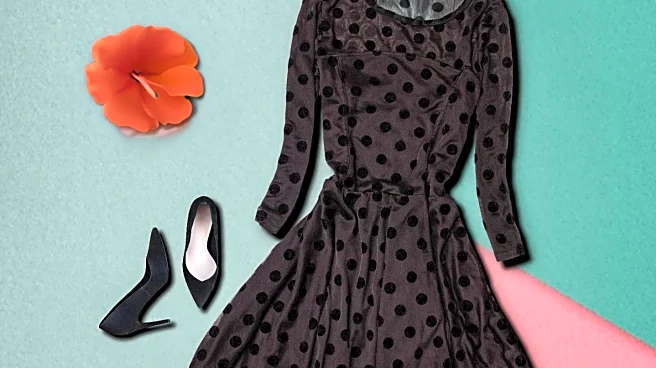What's Happening?
The fashion industry is showcasing a collection of affordable black dresses for the fall and winter seasons, emphasizing the timeless appeal of the little black dress (LBD). These dresses, priced under $300, offer a range of styles from knit dresses to
slinky slips and modern ladylike shapes. Notable brands such as Cos, Madewell, and Favorite Daughter are featured, providing options that combine warmth, style, and elegance. The collection includes second-skin staples from Skims and Wolford, shimmering sequin shifts from Simon Miller, and velvet numbers from J.Crew and Banana Republic. The dresses are designed to be versatile, suitable for various occasions, and easy to accessorize for a chic look.
Why It's Important?
The availability of affordable yet stylish black dresses is significant for consumers seeking elegance without a hefty price tag. This trend reflects a broader movement in the fashion industry towards inclusivity and accessibility, allowing more individuals to participate in fashion trends. The emphasis on versatile and timeless pieces like the LBD supports sustainable fashion practices, encouraging consumers to invest in items that can be worn across multiple seasons and occasions. Brands are responding to consumer demand for quality and affordability, potentially influencing future fashion collections and retail strategies.
What's Next?
As the fall and winter seasons progress, consumers can expect these affordable black dresses to become staples in their wardrobes. Retailers may continue to expand their offerings of versatile and budget-friendly fashion items, responding to consumer preferences for sustainable and stylish clothing. The fashion industry might also see increased collaboration between brands to create collections that cater to diverse consumer needs, further promoting accessibility and inclusivity in fashion.
Beyond the Headlines
The focus on affordable fashion highlights ethical considerations in the industry, such as fair pricing and sustainable production practices. As consumers become more conscious of their purchasing decisions, brands may face pressure to ensure their products are ethically produced and environmentally friendly. This shift could lead to long-term changes in how fashion is designed, marketed, and consumed, with a greater emphasis on transparency and responsibility.
















